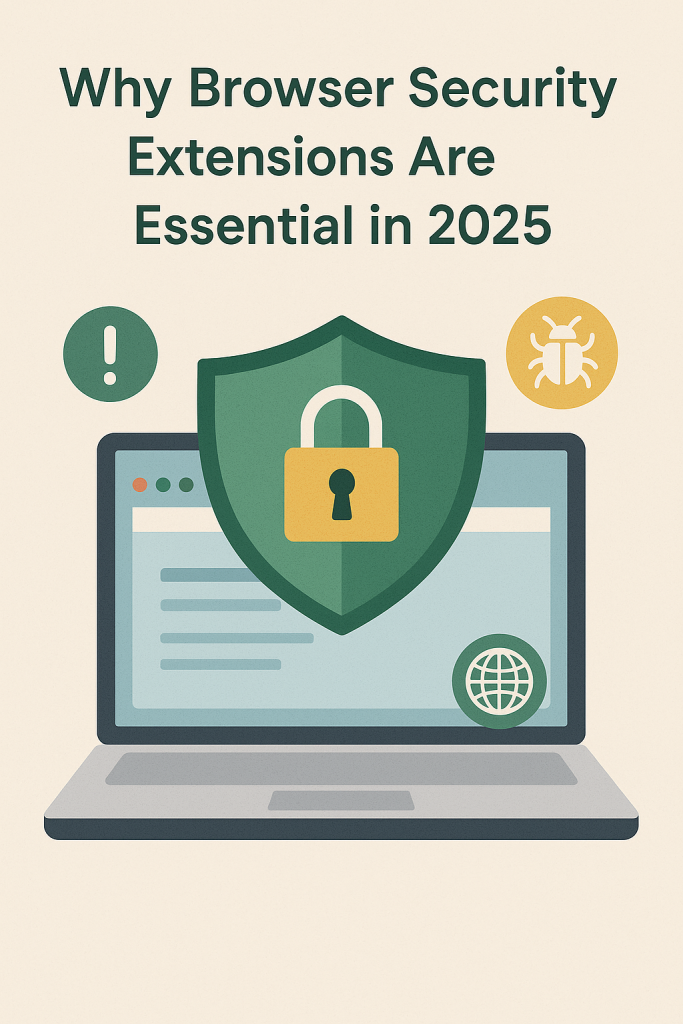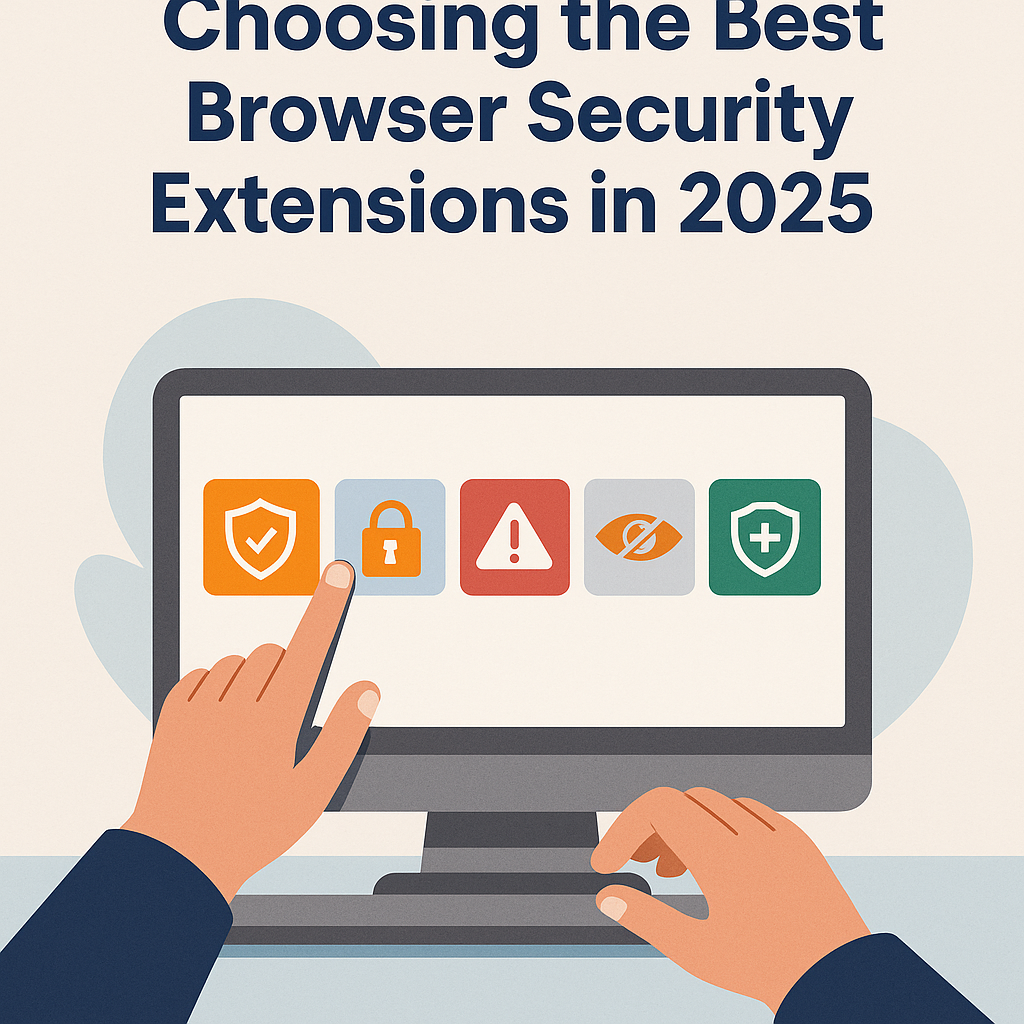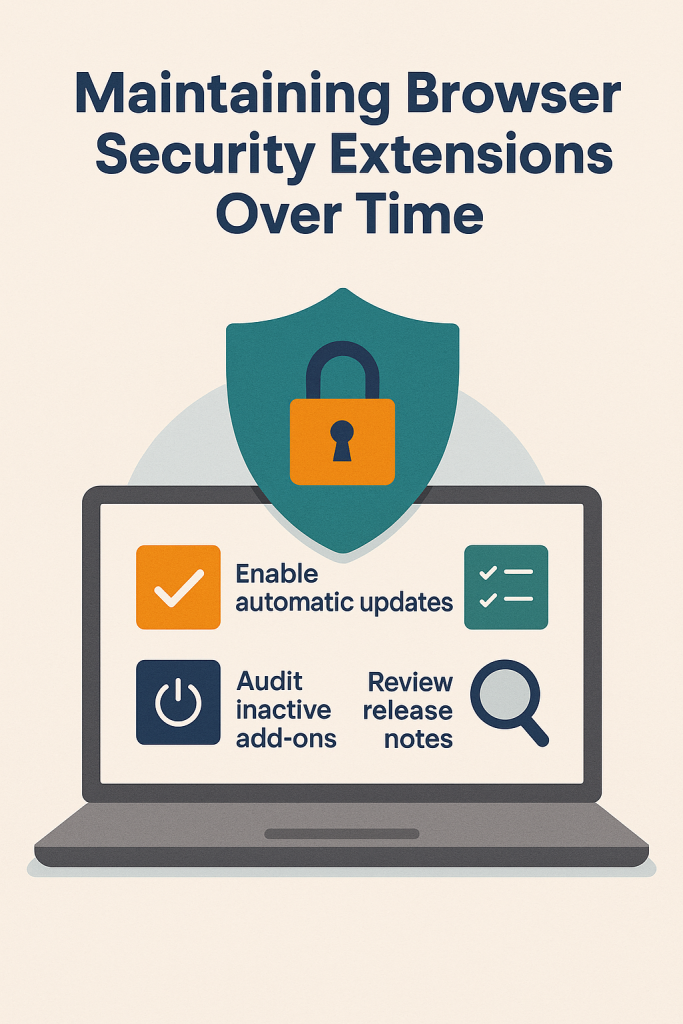Top Tools to Protect Your Online Privacy
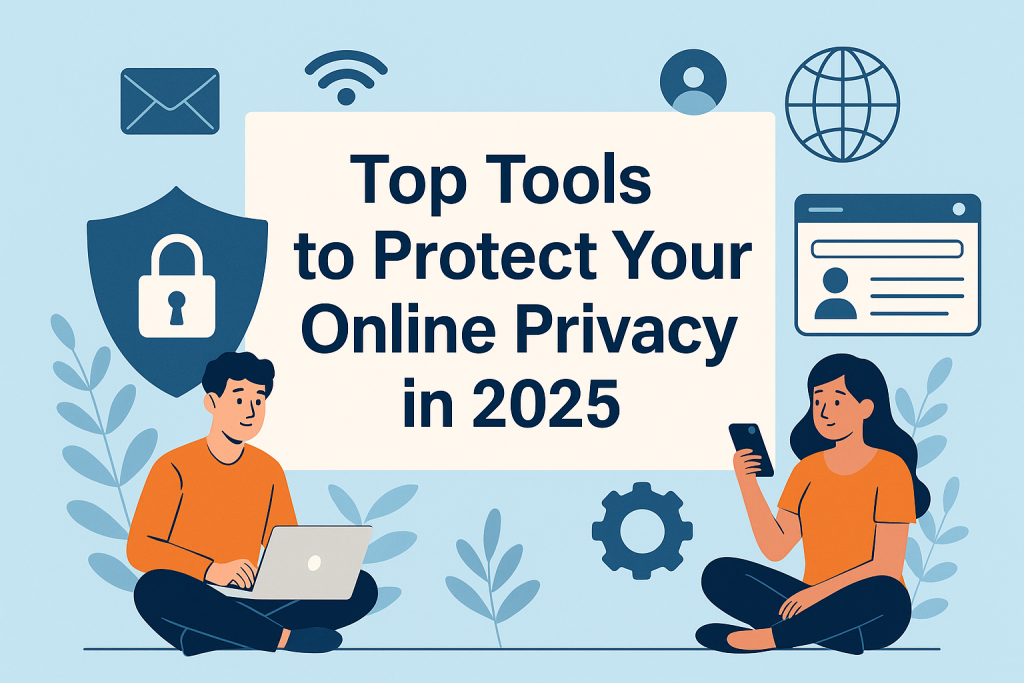
Top Tools to Protect Your Online Privacy in 2025
Why Online Privacy Tools Are Essential in 2025
In today’s hyper-connected world, Online Privacy Tools are essential for protecting personal information from data breaches, tracking, and cyberattacks. Moreover, whether you browse for personal reasons or handle sensitive work data, using a balanced set of privacy solutions ensures a safer and more private online experience. Consequently, digital safety has become a non-negotiable part of daily internet use.
Growing Online Threats—and How Online Privacy Tools Help
Over the past decade, cyberattacks and data leaks have increased dramatically. Additionally, many companies collect and monetize user data without clear consent. Therefore, phishing attacks, malware infections, and browser fingerprinting require a proactive defense strategy. Notably, internet safety tools can block trackers, encrypt traffic, and limit the data collected about you.
Data Collection by Websites and Apps
Most websites and apps gather more data than you realize. As a result, advertising networks build detailed profiles of your behavior. However, using ad blockers and tracker-blocking extensions significantly reduces this kind of surveillance and helps you browse more confidently.
Cybersecurity Risks from Public Wi-Fi
Public Wi-Fi networks are convenient, yet they can be risky. Therefore, a VPN—one of the most effective privacy-focused tools—encrypts your connection, making it much harder for outsiders to intercept your data. Furthermore, with a reliable VPN, you can browse securely even in airports, hotels, and cafés.
Key Benefits of Using Online Privacy Tools
Adopting online protection measures offers several advantages. Moreover, you reduce your exposure to cyberattacks, keep credentials safe, and maintain control over your personal data.
1. Enhanced Data Security
Strong encryption ensures that your internet traffic is secure from hackers and third parties. In addition, browsers like Chrome and Firefox can be strengthened with security extensions to block malicious scripts and prevent unauthorized access.
2. Reduced Online Tracking
Trackers record your browsing behavior across multiple sites. Fortunately, privacy-focused tools can block these attempts and make it harder for companies to build an advertising profile on you. As a result, you also enjoy faster page loads and a cleaner browsing experience.
3. Access to Restricted Content
Some websites or streaming platforms restrict access based on location. Therefore, using a reputable VPN or proxy allows you to bypass these restrictions. For unbiased recommendations, you can explore PrivacyTools.io (normal outbound link).
How to Choose the Right Online Privacy Tools
- Look for a strict no-logs policy and independent audits.
- Ensure it uses strong encryption like AES-256 or ChaCha20.
- Choose tools with good reputations and positive user reviews.
- Check compatibility with your browser and operating system.
Integrating Online Privacy Tools with Your Browser
One of the fastest ways to boost privacy is to harden your browser settings. For complete setup instructions, refer to our guides for Google Chrome and Mozilla Firefox. Additionally, disable unnecessary permissions, enable strict tracking protection, and consider extensions that enforce HTTPS connections.
By combining these browser changes with other digital privacy tools, you create a strong, multi-layered defense that is both effective and easy to maintain over time.
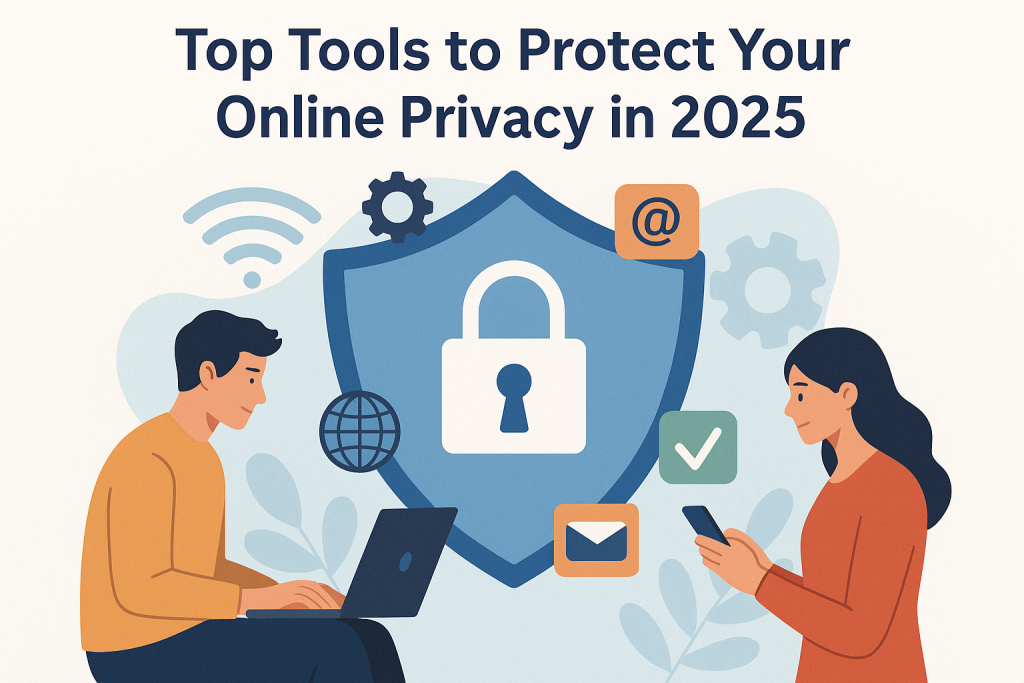
Top Categories of Online Privacy Tools
To create a strong privacy setup, it is important to combine different Online Privacy Tools that work well together. Moreover, blending network-level protections with browser-focused enhancements ensures you have coverage from multiple angles. Consequently, each component strengthens the others and fills the gaps that a single tool cannot cover alone.
1. VPNs as Core Online Privacy Tools
A Virtual Private Network is one of the most effective Online Privacy Tools available today. It encrypts your internet traffic and masks your IP address, making it difficult for ISPs, hackers, or advertisers to monitor your activities. Furthermore, a trustworthy VPN helps you bypass geo-restrictions on websites and streaming services, giving you access to content around the world. When choosing a VPN, always check for a strict no-logs policy and independent security audits.
2. Secure Web Browsers for Online Privacy
Privacy-oriented browsers like Firefox, Brave, and hardened Chrome versions play a key role in keeping you safe online. Additionally, these browsers block trackers, reduce fingerprinting, and prevent many malicious scripts from running. You can further enhance their security by adding browser security extensions that enforce encryption and provide advanced content-blocking features. For alternatives, see Microsoft Edge 2025 and Opera 2025.
3. Ad Blockers and Anti-Tracking Tools for Online Privacy
Ad blockers are not just about removing intrusive ads—they are also powerful privacy tools that reduce online tracking. By blocking trackers embedded in ads, they prevent advertisers from building detailed behavioral profiles. Moreover, using advanced filter lists blocks requests before they even reach your device, making your browsing faster and more private. For the best results, review our Best Ad Blockers 2025 guide for recommendations.
4. Password Managers and Authentication Tools
Weak and reused passwords are one of the leading causes of account breaches. Therefore, a password manager is an essential digital privacy tool. It securely stores unique, strong passwords for each account, and many offer breach alerts to notify you if a password has been compromised. In addition, enabling two-factor authentication (2FA) on all critical accounts adds another layer of security that blocks unauthorized access even if a password leaks.
5. Encrypted Messaging and Email Hygiene
Secure communication is another key aspect of privacy. Encrypted messaging apps like Signal, and email services that offer end-to-end encryption, protect your conversations from interception. Likewise, using disposable email addresses or aliases for sign-ups helps you manage spam and reduce the impact of data leaks. This simple step can make a big difference in your online privacy over time.
Best Practices When Using Online Privacy Tools
- Keep all software, apps, and browser extensions up to date to prevent exploits.
- Combine multiple tools for layered protection, such as a VPN plus an ad blocker.
- Review and limit permissions for apps, websites, and browser extensions regularly.
- Clear cookies, cache, and browsing history frequently to remove stored trackers.
- Regularly audit your privacy settings in both browsers and mobile devices.
Combining Multiple Online Privacy Tools
Using several Online Privacy Tools together provides much better protection than relying on just one. For example, combining a VPN, a hardened browser, and a tracker-blocking ad blocker significantly reduces your online exposure. Additionally, this layered approach ensures that if one tool fails, others continue to protect you. For browser-specific configurations, see our Google Chrome privacy guide and Firefox privacy guide.
How Online Privacy Tools Improve Everyday Life
The right privacy tools not only protect your data but also improve your daily browsing experience. Moreover, these improvements can be felt almost immediately after you start using them.
Faster Browsing Speeds
Blocking ads and trackers significantly reduces the number of elements that load on a page. As a result, websites load faster and consume less bandwidth. This is especially helpful when browsing on mobile networks or slower connections.
Better Access to Global Content
Many online services limit access based on location. Therefore, using a VPN or proxy lets you bypass these restrictions and enjoy content from anywhere. Additionally, this capability is invaluable for remote workers and frequent travelers.
Peace of Mind While Browsing
Knowing that your traffic is encrypted and your activities are hidden from trackers gives you confidence online. Furthermore, you can use public Wi-Fi networks without worrying about potential eavesdropping or data theft.
Outbound Resources for Online Privacy
If you want to learn more about protecting your privacy, explore trusted resources such as the Electronic Frontier Foundation (EFF) (normal outbound link) and PrivacyTools.io (normal outbound link). Additionally, these platforms offer updated tool recommendations, explain privacy laws, and provide step-by-step guides to securing your digital life.
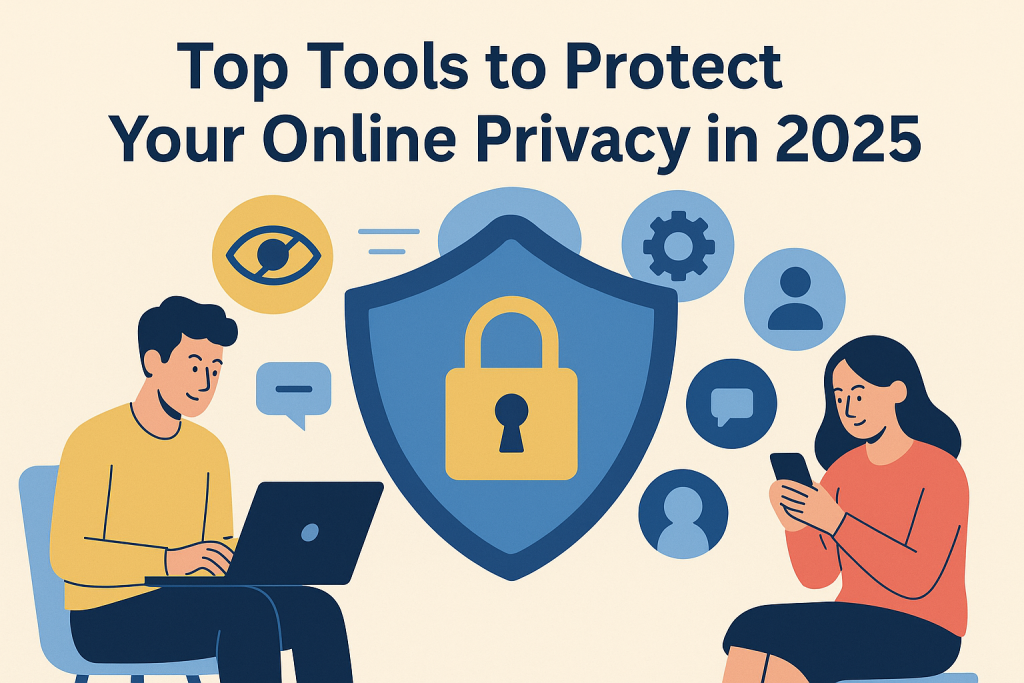
A Practical 30-Minute Privacy Stack with Online Privacy Tools
Building a strong privacy setup does not need to take hours. In fact, with the right Online Privacy Tools, you can secure your devices and accounts in less than 30 minutes. Moreover, by following a layered approach, you ensure that even if one defense fails, the others still protect you. Consequently, your online safety becomes part of your daily routine without requiring constant attention.
Step 1: Harden Your Browser for Online Privacy
Your browser is the gateway to most of your online activity, so hardening its settings is crucial. Disable third-party cookies, enable strict tracking protection, and turn on HTTPS-only mode. Additionally, review permissions for your camera, microphone, notifications, and location, revoking anything unnecessary. For a complete browser hardening guide, see our Google Chrome Guide 2025 and Firefox Browser Guide 2025.
Step 2: Add Core Extensions for Digital Privacy
Once your browser settings are locked down, it’s time to add extensions that block ads, trackers, and malicious scripts. Furthermore, these tools can improve page load speed and reduce data usage. Review our Best Ad Blockers 2025 and Browser Security Extensions lists for proven options that enhance your browsing security.
Step 3: Enable a Trusted VPN
A Virtual Private Network is one of the most versatile Online Privacy Tools available. Choose a no-logs VPN with a kill switch and strong encryption. Additionally, enable auto-connect on public Wi-Fi to ensure your traffic is always protected. Whether you’re at a café, airport, or hotel, this step alone can prevent most types of online snooping.
Step 4: Use a Password Manager and 2FA
Weak passwords are an open door for attackers. Therefore, use a password manager to create and store unique credentials for every account. Moreover, turn on two-factor authentication (2FA) using an authenticator app or hardware key to add another layer of protection. This combination makes it far harder for hackers to access your accounts, even if one password is compromised.
Step 5: Improve Search and Email Practices
Search engines and email services often track user behavior for targeted advertising. Switching to a privacy-friendly search engine eliminates much of this tracking. Likewise, using email aliases when signing up for services keeps your main email safe from leaks and spam. Disabling automatic image loading in email further prevents tracking pixels from gathering data. If you work with websites, here’s a helpful starter resource: Start a WordPress Blog.
Common Mistakes to Avoid with Online Privacy Tools
- Over-relying on one tool: A VPN is not enough—combine it with browser hardening and blockers.
- Delaying updates: Outdated tools can be exploited easily; keep everything updated.
- Granting excessive permissions: Review extension and app permissions regularly.
- Ignoring 2FA recovery codes: Store recovery codes securely to prevent account lockouts.
- Using public Wi-Fi without protection: Always turn on your VPN before logging in.
Quick Troubleshooting Tips for Online Privacy
- Website not loading correctly: Allow scripts or trackers temporarily for trusted sites only.
- VPN slowing your connection: Switch to a closer server or try a faster protocol like WireGuard.
- Too many CAPTCHAs: Reduce aggressive anti-fingerprinting settings for specific trusted sites.
- Extension conflicts: Disable one extension at a time to identify the source of the problem.
Policy and Compliance for Teams Using Privacy Tools
For organizations, tools alone are not enough—clear policies are essential. Additionally, frameworks such as OWASP (normal outbound link) and the NIST Cybersecurity Framework (normal outbound link) provide actionable guidelines for security and privacy. Consequently, aligning with these frameworks helps ensure compliance and builds trust with clients.
Privacy-First Daily Habits for Online Safety
- Verify links before clicking, and expand shortened URLs when in doubt.
- Use separate email addresses or aliases for different types of accounts.
- Share files via restricted access links instead of public ones.
- Keep device encryption enabled at all times.
- Check your email in Have I Been Pwned (normal outbound link) to monitor breaches.
FAQ About Online Privacy Tools
Does a VPN make me fully anonymous?
No. While it hides your IP and encrypts traffic, it cannot stop tracking via cookies or browser fingerprinting. Therefore, combine it with other Online Privacy Tools for better protection.
Will an ad blocker remove every ad?
Not always. However, stricter filter lists can increase blocking rates, but they may also break some websites.
Which browser is the safest?
The safest browser is the one you keep updated and properly configured. For browser optimization, see our Firefox guide and Chrome guide. You can also compare options here: Chrome vs Brave.
Final Checklist for Online Privacy
- Harden browser settings and audit permissions.
- Install ad blocker, anti-tracker, and HTTPS enforcement extensions.
- Use an audited VPN with a kill switch and auto-connect feature.
- Enable a password manager with 2FA and secure recovery codes.
- Adopt privacy-friendly search engines and email aliases.
- Maintain regular updates, clean cookies, and monitor breaches.
Wrap-Up: Make Online Privacy a Daily Habit
When Online Privacy Tools work together and you follow safe browsing habits, privacy becomes second nature. Additionally, by updating tools regularly and keeping security settings strict, you stay ahead of evolving threats. For more insights, visit our guides on Google Chrome, Firefox, and comparisons of Best Ad Blockers 2025 and Browser Security Extensions. For additional resources, check EFF and PrivacyTools.io (normal outbound links) to stay informed and protected.

